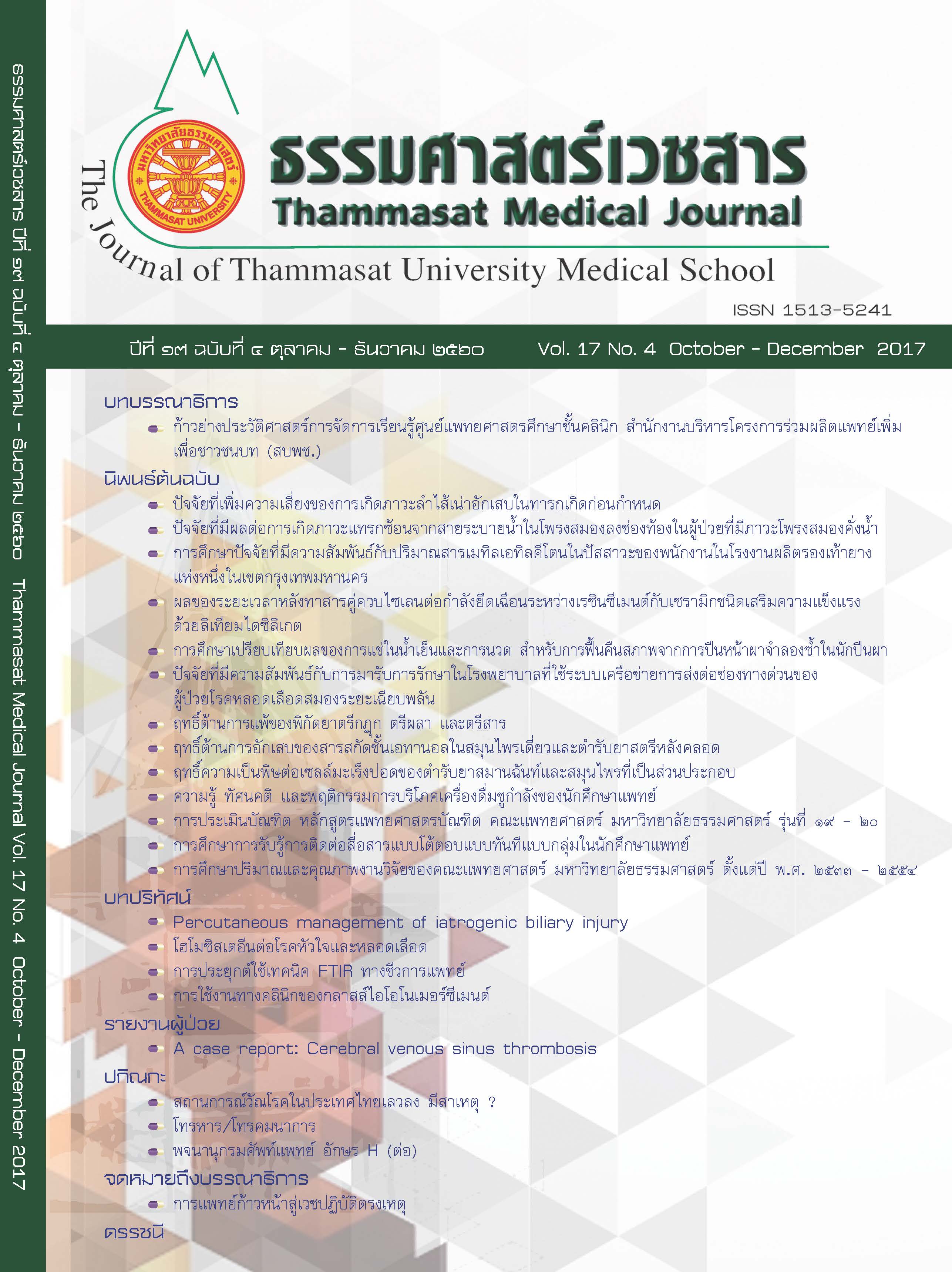Comparative study of effect between cold water immersion and massage on recovery from repeated rock climbing in climbers
Keywords:
Recovery strategy, Grip strength, Massage, Cold water immersion, Rock climbing, การฟื้นคืนสภาพ, แรงบีบมือ, การนวด, การแช่ในน้ำเย็น, การปีนหน้าผาจำลองAbstract
Introduction: The recovery strategies were applied to recover climbing performance during break. Massage and cold water immersion were popular modalities that might be effective to recover core temperature, grip strength and climbing performance. However, there were a few studies on the effect of these two recovery strategies on climbing performance in climbers. Objective was to study effect between cold water immersion and massage on recovery from repeated rock climbing in climbers.
Method: Seventeen volunteer climbers participated in three climbing tests. Each recovery strategy was applied in randomized order: massage, cold water immersion and rest on chair. Mean difference from baseline of tympanic temperature and grip strength were compared at pre-climbing test 1, post-climbing test 1, post-recovery and post-climbing test 2. Climbing scores were compared between both 2 climbing tests.
Result: Tympanic temperature had significant decrease in massage and cold water immersion groups. While it found no difference of grip strength after receiving any recovery protocols. There were significant decreases of climbing scores in rest on chair and massage groups.
Discussion and Conclusion: Massage and cold water immersion could reduce tympanic temperature but could not improve grip strength. While, cold water immersion could maintain climbing score better than massage and rest on chair.
บทคัดย่อ
บทนำ: กลวิธีการฟื้นคืนสภาพร่างกายนำมาใช้เพื่อช่วยฟื้นฟูนักกีฬาระหว่างพักเพื่อให้พร้อมที่จะแข่งขันต่อไป การนวดและการแช่ในน้ำเย็นเป็นวิธีการที่นิยมใช้เพื่อช่วยฟื้นฟูอุณหภูมิแกนกลางร่างกาย แรงบีบมือ และความสามารถในการปีน แต่ยังมีการศึกษาไม่มากนักที่เปรียบเทียบความแตกต่างของการฟื้นฟูดังกล่าวในการปีนหน้าผาจำลอง วัตถุประสงค์เพื่อศึกษาผลของการช่วยฟื้นคืนสภาพด้วยการแช่ในน้ำเย็นและการนวดต่อความสามารถในการปีนหน้าผาจำลองซ้ำในนักปีนผา
วิธีการศึกษา: อาสาสมัคร ๑๗ คน เข้าทดสอบ ๓ วัน แต่ละวันจะได้รับกลวิธีการฟื้นคืนสภาพที่ต่างกัน ได้แก่ การนวด การแช่ในน้ำเย็น และการนั่งพัก เปรียบเทียบค่าความแตกต่างเมื่อเทียบกับค่าเริ่มต้นของตัวแปรอุณหภูมิในช่องหู แรงบีบมือ ที่วัดก่อนปีน หลังปีนครั้งที่ ๑ หลังการฟื้นฟู และหลังปีนครั้งที่ ๒ และเปรียบเทียบคะแนนการปีนทั้ง ๒ ครั้ง
ผลการศึกษา: อุณหภูมิในช่องหูลดลงอย่างมีนัยสำคัญทางสถิติในกลุ่มที่ได้รับการนวดและการแช่ในน้ำเย็น ในขณะที่ไม่พบความแตกต่างของแรงบีบมือภายหลังการได้รับการฟื้นคืนสภาพใดๆ และพบว่ากลุ่มที่นั่งพักและการนวดมีคะแนนในการปีนลดลงอย่างมีนัยสำคัญทางสถิติ
วิจารณ์ และสรุปผลการศึกษา: การฟื้นคืนสภาพด้วยการนวด และการแช่ในน้ำเย็น ช่วยให้อุณหภูมิในช่องหูลดลง แต่ไม่ช่วยให้แรงบีบมือเพิ่มขึ้น ในขณะที่การแช่ในน้ำเย็นช่วยรักษาระดับของคะแนนการปีนได้ดีกว่าการนวดและการนั่งพัก



